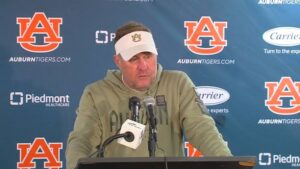Auburn, AL – In a stunning revelation that has sent shockwaves through the college football world, Auburn University has announced that head football coach Hugh Freeze has been diagnosed with an early form of prostate cancer. The news, released via an official statement on X (formerly Twitter), has ignited a flurry of speculation and concern among fans and analysts alike.
The statement, while confirming the diagnosis, sought to reassure the Auburn faithful. It emphasized the early detection of the cancer, labeling it “very treatable and curable.” Doctors have reportedly expressed optimism about Freeze’s prognosis, predicting a full recovery with appropriate treatment. This attempt to mitigate panic, however, has only fueled further questions about the coach’s immediate and long-term future.
Despite the diagnosis, Freeze intends to maintain his “normal coaching duties and responsibilities,” according to the university. This decision raises concerns about the potential strain on his health as he navigates the demanding schedule of a Division I head coach. The intense pressures of recruiting, game preparation, and public appearances are well-documented, and the added burden of medical treatment could prove challenging.
Freeze, 55, is a seasoned veteran of the college football landscape, entering his second season at Auburn and his 12th overall as a Division I head coach. His career, marked by stints at Liberty, Ole Miss, Arkansas State, and several other institutions, has been both successful and controversial.
His tenure at Ole Miss, in particular, was marred by NCAA investigations and subsequent penalties, casting a shadow over his otherwise impressive record. Now, as he faces a personal health challenge, the spotlight on Freeze intensifies, with many wondering how this diagnosis will impact his legacy.

In his two seasons at Auburn, Freeze has compiled an 11-14 record, a performance that has drawn mixed reactions from fans. While some appreciate his efforts to rebuild the program, others have expressed impatience for more consistent success. His overall career record stands at 94-57, a testament to his coaching acumen, but also a reminder of the high expectations he faces.
The timing of the diagnosis adds another layer of complexity. With spring practice scheduled to begin on March 25 and the highly anticipated A-Day Spring Game set for April 12, Freeze’s ability to fully participate remains uncertain. The university’s statement suggests he will continue his duties, but the realities of medical treatment could necessitate adjustments.
The news has sparked an outpouring of support from across the college football community. Rival coaches, former players, and fans from various schools have extended their well wishes to Freeze, demonstrating the widespread respect he commands.
However, the diagnosis also raises practical questions about Auburn’s contingency plans. Should Freeze’s health require him to step back from his duties, who would step in to lead the team? The university has not addressed this issue, leaving fans to speculate about potential interim coaches.
The immediate focus, however, remains on Freeze’s health and recovery. The Auburn community is united in its support for their coach, hoping for a swift and complete return to the sidelines.
This situation also brings to light the broader issue of men’s health and the importance of early detection. Prostate cancer is a common diagnosis among men, and Freeze’s public battle could serve as a powerful reminder for others to prioritize their health.
As the Auburn football program navigates this challenging period, the focus will undoubtedly shift between Freeze’s health and the team’s performance. The coming weeks and months will be crucial in determining the long-term impact of this diagnosis.
Ultimately, the story of Hugh Freeze’s battle with prostate cancer is one of resilience and determination. It is a story that will be closely watched by the college football world, as fans and analysts alike hope for a positive outcome. Will this diagnosis define his career, or will his strength define his recovery? Only time will tell.